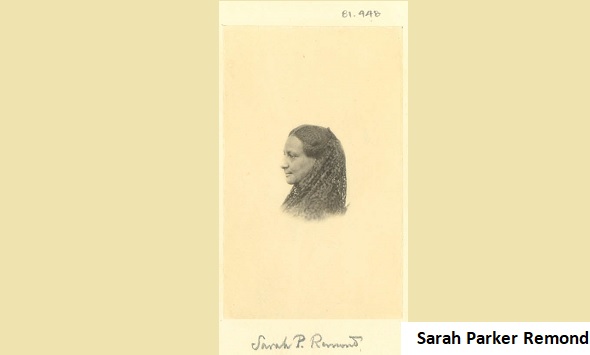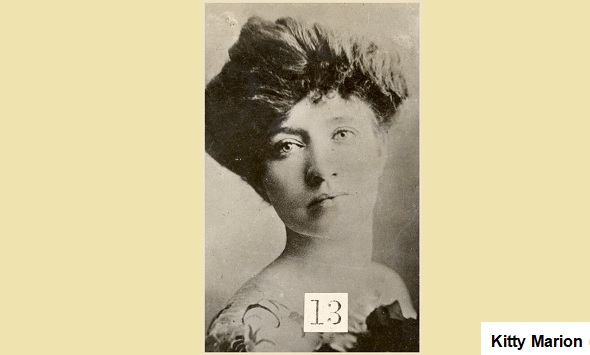Migrant voices, women's vote
Migrant voices, women's vote
.png)
It is 100 years since British women won the right to vote. Few know that members and leaders of campaign groups included women and men of migrant heritage, from Germany to the USA, from Guyana to Australia.
When plans to deliver a petition to Parliament on women’s suffrage were drawn up in 1866, signatures were collected at Aubrey House, a centre of radical thought in London. The signatories included Harriet Martineau, a descendant of Huguenot refugees from France whose popular writings condemned slavery and the inequality of women.
Another signatory was Sarah Parker Remond, a free African-American from Massachusetts, who made her first speech on abolition at the age of 16. Sent on a speaking tour of Britain by the American Anti-Slavery Society, she addressed large audiences on emancipation and women’s inequality. She studied in London and became a British citizen before leaving to become a doctor in Italy.

The young Emmeline Pankhurst, leader of the Suffragettes, whose mother was from the Isle of Man, was inspired when she heard another visitor to Aubrey House, Lydia Becker, speaking in Manchester. Becker was the granddaughter of a German textile manufacturer. She was a botanist and corresponded with Charles Darwin yet, as a woman, was excluded from joining or speaking at meetings of scientific organisations. Becker founded the Manchester National Society for Women’s Suffrage in 1867. Her speeches in the Isle of Man led to the Tynwald becoming in 1881 the world’s first national parliament to give women the right to vote in a general election.
Pankhurst was succeeded as president of the Committee of the Suffragette Fellowship by Princess Sophia Duleep Singh, a daughter of the last Maharajah of Punjab and his German-Abyssinian wife. Her godmother was Queen Victoria, an opponent of women’s suffrage. Singh became increasingly radical after seeing colonial rule in India and meeting leaders of the Independence movement. In November 1910 she was part of a deputation to the Prime Minister on so-called Black Friday when many women assaulted by the police.
Like many suffragettes, Singh was also an active member of the Women’s Tax-Resistance League (“No Vote No Tax”) and saw her property seized and sold. The League was the idea of Dora Montefiore, an Anglo-Australian who became a suffragette after her husband’s death when told she had no automatic right to be guardian to her own children. In an era before air travel, she became a suffrage campaigner on two continents. She hosted the first meeting of the Womanhood Suffrage League of New South Wales in Sydney in 1891 and was a cofounder of the first London branch of the Women’s Social and Political Union in 1903.
Another Australian, Muriel Matters was, according to the blue plaque on her home in Hastings, the first woman to speak in the House of Commons. Matters was an actor and journalist from South Australia where women had won the vote in 1894. In 1908 she chained herself to the cage in front of the Ladies’ Gallery in Parliament and made a loud speech critical of MPs. After her chains were filed off, Matters was imprisoned for again demonstrating outside Parliament. The following year she made world headlines when she flew over London, leafleting from an airship emblazoned ‘Votes for Women.’
Suffragettes in prison were not treated as political prisoners. In protest, many went on hunger strike. The government decreed they should be force-fed in a process that was tantamount to torture, leaving some with permanent injuries and damage to physical or mental health. By the time she left prison in 1914, music hall artiste Kitty Marion had been force-fed 232 times. Born Katherine Marie Schäfer, Marion had fled Germany and a violent home only to find herself the victim of sexual harassment by theatrical agents and managers in London.

She campaigned for theatrical agents to be licensed and helped set up the Actresses’ Franchise League. She smashed windows in the West End and burned down the home of an MP and the grandstand at Hurst Park racecourse. When the First World War broke out, Marion was falsely accused of being a German spy. She emigrated again, this time to New York. There she campaigned for birth control, helped open the first contraceptive clinic – and was again imprisoned for her activism.
After her time in prison, Emmeline Pankhurst was nursed back to health at the house of Hertha Ayrton, another Black Friday delegate. Ayrton was born Phoebe Sara Marks. Her father, a Jewish clockmaker, had fled Tsarist persecution in Poland. Ayrton’s widowed mother Alice was poor but she and her sister, a teacher, were determined Ayrton would receive an education. Ayrton read maths at Girton College, Cambridge and became a physicist and inventor. She was the first female member of the Institution of Electrical Engineers though, as a married woman, was refused membership by the Royal Society. In 1914 Ayrton helped form the United Suffragists of which she and her daughter Barbara, later a London MP, were officers.
The Irish Constance Markiewicz became the first woman MP in 1918 but, like other Sinn Féin members, refused to take her seat at Westminster. United States-born Nancy Astor was the first woman MP in 1919. Ironically, Astor had not supported the women’s suffrage campaign unlike Britain’s first – male – Indian MP, Dadabhai Naoroji, a council member of the Women’s Franchise League.
Another male supporter, Prussian political refugee Dr Louis Borchardt, hosted the Manchester meeting where Lydia Becker had inspired Emmeline Pankhurst. Israel Zangwill, son of immigrants from Latvia and Poland and author of the play The Melting Pot, married Hertha Ayrton’s stepdaughter Edith. They became members of the Jewish League for Woman Suffrage.
Donald Adolphus Brown, a foreman at the Royal Arsenal in Woolwich and son of a freed slave from Guyana, was married to Adelaide Knight, a prominent London suffragette imprisoned after Black Friday. The couple were socialists and joined the Adult Suffrage League where they continued to campaign for suffrage for all adults, an aim finally achieved in 1928.


